Trap Grounds
The Trap Grounds (aka Trap Grounds Town Green) is a nature reserve in Oxford, Oxfordshire, England, owned by Oxford City Council.[1][2][3]
| Trap Grounds | |
|---|---|
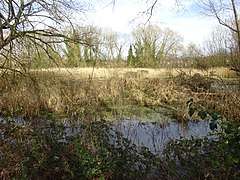 View of the Trap Grounds | |
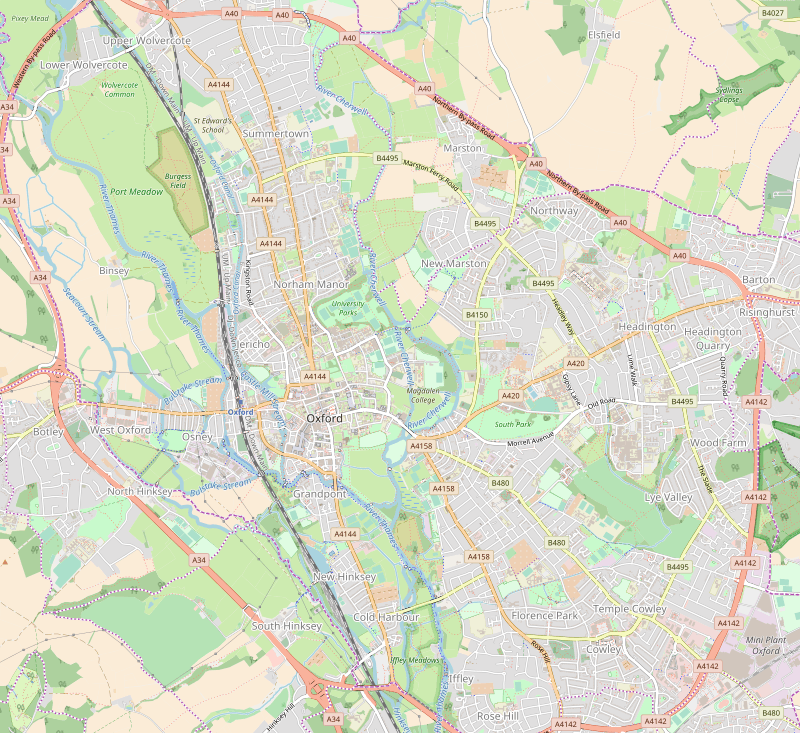 Trap Grounds 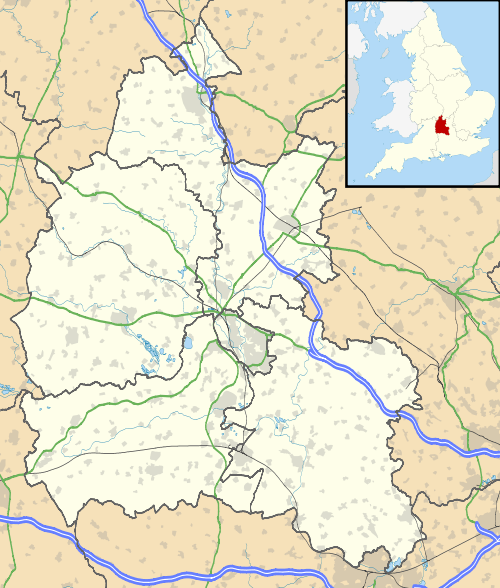 Trap Grounds Location within Oxfordshire | |
| OS grid reference | SP 503 081 |
| Civil parish |
|
| District | |
| Shire county | |
| Region | |
| Country | England |
| Sovereign state | United Kingdom |
| Post town | Oxford |
| Postcode district | OX2 6XW |
| Dialling code | 01865 |
| Police | Thames Valley |
| Fire | Oxfordshire |
| Ambulance | South Central |
| UK Parliament | |
| Website | trap-grounds.org.uk |
Overview
The site is to the east of the railway line and the Burgess Field Nature Park, to the west of the Oxford Canal and Hayfield Road in North Oxford, south of Frenchay Road and the Waterways housing estate, and north of SS Philip and James' Church of England Primary School and Aristotle Lane. Further to the west is Port Meadow and the River Thames. Further to the north is a Site of Special Scientific Interest (SSSI), Hook Meadow and The Trap Grounds. Also close by are the separately organized Trap Ground Allotments.[4][5] The original Trap Grounds were much more extensive,[6][7] including Burgess Field, but the present site is now largely surrounded by built-up suburbs of Oxford.
The area is on a reclaimed rubbish dump site and is approximately 3.8 hectares (9.4 acres) in size.[1] The site consists of woodland, reed beds, ponds, some grass areas, and paths including a boardwalk. There is a single point of entry to the site immediately to the south of Frenchay Road Bridge on the canal. Wildlife on the site includes slow worms.[8]
History
In 2002, there was a public inquiry about converting the Trap Grounds, which was owned by the city council of Oxford at the time, to a town green.[9] This inquiry would have made the Trap grounds open and accessible for public use. In 2003, a court considered another bid for the Trap Grounds to become a town green, this time as a preamble for a bid to develop the land into housing units.[10] Later during 2005–06, a case involving Oxfordshire County Council and Oxford City Council to decide the future of the Trap Grounds was decided in the House of Lords.[11][12] In 2007, Catherine Robinson of The Friends of The Trap Grounds, was awarded the Campaign to Protect Rural England's top honour for protecting the Trap Grounds from development.[13] In 2010, a new walkway was created on the site.[14] In 2012, there was discussion on how much access there should be to the site.[15]
The Friends of The Trap Grounds
The Friends of The Trap Grounds is a volunteer organization that helps to maintain the Trap Grounds.[16]
Panoramic view
Image gallery
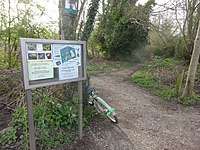 The entrance of the Trap Grounds.
The entrance of the Trap Grounds.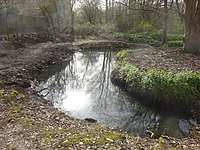 A pond at the Trap Grounds.
A pond at the Trap Grounds.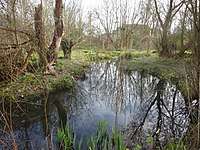 Waterway through the Trap Grounds.
Waterway through the Trap Grounds.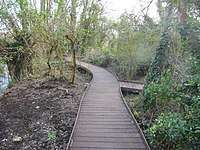 The boardwalk in the Trap Grounds.
The boardwalk in the Trap Grounds.
See also
References
- "Countryside and nature reserves – Trap Grounds Town Green". UK: Oxford City Council. Retrieved 4 April 2020.
- "Trap Grounds, Oxford". Nature Reserves. UK: Oxford Conservation Volunteers. Retrieved 4 April 2020.
- "Trap Grounds Town Green". Nature Reserves. UK: Daily Info. Retrieved 4 April 2020.
- "Allotments – Trap Grounds, Aristotle Lane". UK: Oxford City Council. Retrieved 7 January 2020.
- "Location". Trap Ground Allotment Association. Retrieved 7 January 2020.
- "Sheet 033 – Map of Oxfordshire. Originally published by Ordnance Survey, Southampton, 1882–1887". British History Online. Retrieved 4 April 2020.
- "Trap Grounds, Oxfordshire". A Vision of Britain through Time. Retrieved 4 April 2020.
- Hughes, Pete (4 January 2018). "Slow worm population boom at Oxford's Trap Grounds nature reserve". Oxford Mail. Retrieved 11 May 2020.
- "Public inquiry into Trap Grounds". Oxford Mail. 1 November 2002. Retrieved 5 April 2020.
- "Court to consider Trap Grounds bid". Oxford Mail. 9 May 2003. Retrieved 5 April 2020.
- "Judgments – Oxfordshire County Council (Respondents) v. Oxford City Council (Appellants) and another (Respondent) (2005) and others". UK: House of Lords. 24 May 2006. Retrieved 4 April 2020.
- "Trap Grounds" (PDF). UK: Open Spaces Society. February 2012. Retrieved 4 April 2020.
- Sheldrick, Giles (27 June 2007). "Top honour for Trap Grounds campaign". Oxford Mail. Retrieved 5 April 2020.
- Ffrench, Andrew (7 March 2010). "Path clear for Trap Grounds' wildlife watch". Oxford Mail. Retrieved 5 April 2020.
- Little, Reg (17 May 2012). "Groups fall out over Trap Grounds entry". Oxford Mail. Retrieved 4 April 2020.
- "About". UK: The Friends of The Trap Grounds. Retrieved 4 April 2020.
External links
| Wikimedia Commons has media related to Trap Grounds. |
